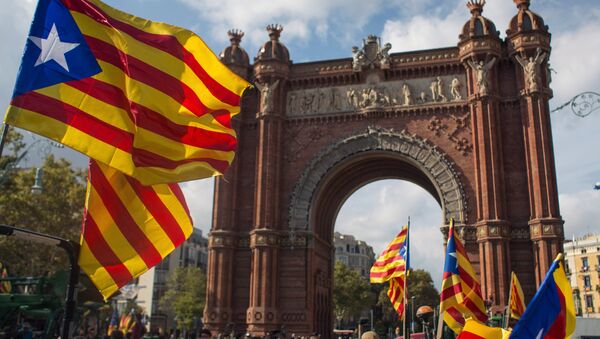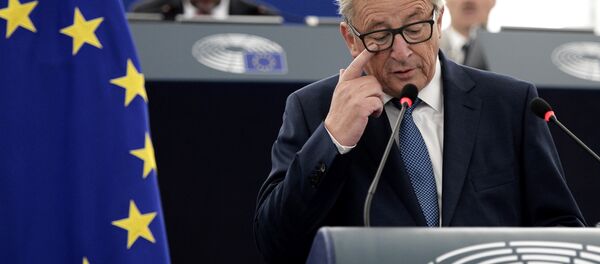MOSCOW (Sputnik) — Catalan President Carles Puigdemont signed and immediately suspended the declaration of independence for several weeks on Tuesday.
The document which declares Catalonia an “independent and sovereign state,” although signed on Tuesday, has been declared by Puigdemont to remain ineffective for several weeks until the end of the suspension period. Puigdemont justified his decision as a compromise between following the “people’s will,” shown by 90 percent of voters backing independence, and his desire to "de-escalate" the tension with Madrid that has resulted.
After Puigdemont’s appearance, Spanish Prime Minister Mariano Rajoy announced the following day that Catalonia had eight days before Article 155, which suspends Catalonia’s autonomy and places the region under direct Spanish rule, is enacted.
EU Could Step in as Mediator
The European Commission has released a statement to the press in which it stated that this is an “internal matter” for Spain and urged both sides to come to an agreement between themselves.
Folch argued that there could be another, economic motive to the EU refusal to become involved.
“We must not forget that the EU only cares about common economic interest protection and on this field its interest is not the wishes of the people, its interest is the economic stability of the group,” Folch said.
Since the EU press release, Jean Claude Juncker, the president of the European Commission, stated that the Commission will not mediate if only one side wants dialogue. So far Madrid has not stepped forward with an offer of talks.
Catalonia Wants to Talk
Catalan parties, therefore, want Spain to also express a desire for dialogue, as they see Puigdemont’s suspension of independence as the first move towards a resolution.
“It must be the responsibility of the Spanish side to accept the opportunity of an open political dialogue to solve the problems and situations in Catalonia,” Folch said.
Even though Catalan parties are open to starting a dialogue, they are not sure that a compromise could be reached between Barcelona and Madrid. This stems from an unequal footing between the two sides.
“We need this mediation between equals, not between a state and a community because then they are not going to recognize us the same way as they are. We need to be an independent republic to do this kind of negotiation, to be at the same level as Spain,” Aina Tella Arbos, the head of international relations in the Popular Unity Candidacy party, said.
The aims of the two countries may also be too different, now that there seems to be no way that Spain will allow Catalonia to even preserve any previous autonomy it may have had, according to the politician.
“Mariano Rajoy, the prime minister of Spain, just made his speech in the Spanish parliament and it was clear again that there is no space for dialogue with Spain. The maximum political autonomy we could have is what we already had. We cannot abandon our own process of political development, political autonomy or sovereignty. So there is no chance to have a pact with Madrid,” Arbos said.
“They don't understand this is a political issue, not a legal one,” Enric Pineda, the chairman of the Pirate Party of Catalonia, said.
Pineda speculates that if Catalonia would be allowed to hold a second referendum, then this would legitimate the results of the first one.
“We need to build something new, not to imitate what is already done, to replicate the formula of the Spanish state. The only way to do this is to declare that we have a new republic, the Catalan republic,” Arbos from the Popular Unity Candidacy said.
It will be clear whether independence is a success in the following week when the deadline imposed by Spain to declare independence will run out and there will inevitably be a confrontation between Catalonia and Madrid.




